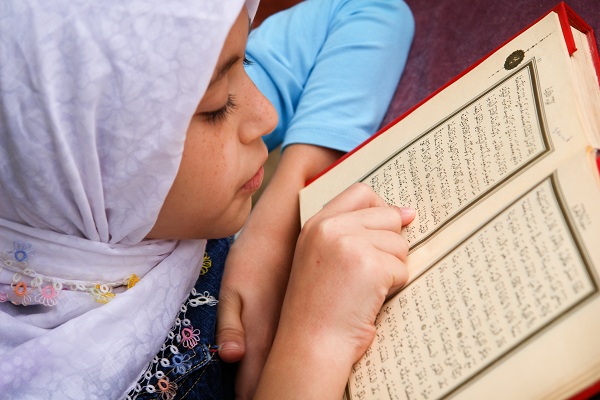
The Quran is a special gift that was provided to all of mankind. Muslims are truly blessed to have Allah’s own words to establish a foundation to guide us to success in this life and in the Hereafter. Learning to read, recite, and memorize the Quran is an important goal for every Muslim. Since its revelation, Muslims have cherished the memorization of the Quran in the manner in which it was revealed with tajweed or beautification. Some set their goals higher to become hafiz/hafizah, memorizing the Holy Book in its entirety, may Allah reward thier efforts.
It is important, no matter how big the goal, to embark on the work of memorizing the Quran from a position of love and respect for it. Too often, children are enrolled in classes or work with teachers who use rigid and even hostile methods to force Quranic Arabic training. There are stories of children getting beaten for mistakes or crying and refusing to go to Quran class. This is a travesty and is not in concert with the teachings of our Prophet Muhammad, peace and blessings be upon him, the one to whom the Quran was revealed, and the one who was our first Quran teacher.
We know that a young mind has the capacity for learning language with ease. We have watched it ourselves in our homes when they learned to speak English and other native languages. Learning the Quran without also nurturing a love for it, is shortsighted. We may give children some skills at recitation, but it will not help them to respect the guidance of the Quran which is the ultimate purpose of its revelation.
There is another way. Here are 10 tips to help your kids love the Quran.
1. Immerse yourself in the Quran.
As a parent, you are your child’s first teacher. Kids listen to what you say but also watch closely to see if your actions match your words. The goal here is to touch your child’s heart with a love of Allah and by extension a love and respect for His words, the Holy Quran. For suggestions about how to jump start or strengthen your own relationship with the Quran, check out Connecting Parents to the Quran, Too.
2. Make Duaa.
Nothing happens without Allah’s authorization and everything is possible with His assistance. Duaa is the most powerful asset of a believer, particularly the duaa of a parent for a child. Be sure your intentions are pure and your goals are in line with Islamic guidance. And plan to support whatever you are asking for in a consistent manner. It will still take work to accomplish these goals. And when your child starts a new lesson, be sure to use the duaa for seeking knowledge, “My Lord! Increase me in knowledge” (Surah Taha, 20:114).
3. Establish a supportive learning environment.
The Arabic word tarbiyah describes the general upbringing of a child by providing them with well-rounded physical, educational, moral, and spiritual support. It is important to establish a wholesome learning environment for the pursuit of Arabic language skills and memorization of the Quran. Focus on the following details:
- Demonstrate that your child’s learning is significant and pleasing for you.
- Allow your child to participate in decisions about the learning venture, particularly keeping in mind their individual learning styles.
- Acknowledge progress and achievements.
- Listen when they express frustrations.
- Work on improving weaknesses without discouraging or disparaging your child.
- Welcome their correction of your recitation errors.
- Urge them to share what they have learned.
4. Listen to the Quran frequently.
The recitation of the Quran is beautiful and touches hearts. There are several beautiful reciters to choose from and you can encourage your child to figure out his/her favorite. Here are some links to help you find a reciter of your choice:
- https://www.quranexplorer.com/quran/ - For this resource, use the drop down menu labelled “Reciter” to listen to each one.
- https://quran.com/1/1-7?reading=true - For this resource, click on “Settings” then click on “Choose Reciters.”
- https://recitequran.com/settings/reciters - This detailed interface shows you the alphabetical order of reciters, the reciters who are good with helping you improve your pronunciation, reciters who recite slowly to help you memorize, those who are also teachers, and even children reciters - a great examples to share with your kids!
Hearing the Arabic language and tajweed will soften hearts, help the listener tune into the nuances of the language, and help them with their own recitation.
5. Find a suitable class and/or teacher.
While parents are their children’s first and most important teacher, not all parents have the skills to teach their children proper Quran recitation with tajweed. A class setting or work with a private tutor may be a productive alternative. In choosing a school or teacher, be sure to discuss your child’s likes and dislikes and learning style in order to ensure a good fit. If the school or instructor is not interested in these details, then it is quite possible they will not provide your child with a positive learning experience. A child who cannot make a connection with a teacher may not be motivated to learn from them.
The Holy Quran, our Book of Guidance and the word of our Creator, is the most important thing any of us can learn. We are reminded that “the best among you are those who learn the Quran and teach it” (Sahih Bukhari). There are many who have beautiful recitation but Quranic guidance should be reflected in the manner of the teacher himself/herself. Be careful that your child is not turned off by the approach to learning it and learning from it.
For additional considerations and suggestions, check out When to Start with Arabic Language Training.
6. Envision a greater reward.
Explain to them the importance of learning and reciting the Quran. The ultimate reward for the hafiz/hafizah or person who memorizes the entire Quran is to achieve the highest ranks in Jannah.
The Prophet Muhammad, peace and blessings be upon him, said: “It will be said to the companion of the Quran – Recite and rise in status, recite as you used to recite in the world, for your status will be at the last verse that you recite” (Abu Dawood and Tirmidhi).
Even if memorizing the entire Quran is not the goal, there is still great benefit for the effort.
The Prophet’s wife, Aisha, may Allah be pleased with her, reported the Prophet, peace and blessings be upon him, said: “One who is skilled in the Quran is associated with the noble, upright recording angels, and he who falters when he recites the Quran and finds it difficult for him will have a double reward” (Sunan Abi Dawud 1454).

7. Seek to understand and to learn from it.
“This is a blessed Book which we have revealed to you [O Muhammad] that they might reflect upon its verses and that those of understanding would be reminded” (Surah Sad 38:29).
Quran is full of stories and lessons. If you are not an Arab speaker, you should also be reading a translation of the Quran. If the words and concepts are difficult for young children to understand, simplify them. There are books geared toward children which are excellent resources here. Check out the Quran for Little Hearts series or The Greatest Stories form the Quran from Goodword Books.
There are also Islamic animations that are great resources. Check out Sound Vision’s Adam’s World videos (featuring the infamous puppet Adam and his little sister Aneesah) on YouTube or on AdamsWorldApp.com.
8. Create and maintain a routine.
Creating and maintaining a routine is critical to any venture. This is particularly true with learning a new language that you may not be using in daily conversation. Make time for the Quran, no matter how busy the schedule. Once the routine is established, it is important to be consistent and keep up with it. In a family setting, it may be helpful for everyone to focus on the Quran at the same time each day. Success will come from consistency and practice, inshaAllah.
9. Challenge them to do their best.
Remember, learning can also be fun! Find ways to challenge your children. This includes opportunities to play games that relate to Arabic letters and vocabulary, Quranic knowledge, and even timed recitation tests. You can make and post progress charts to encourage competition within the family (being careful, of course, that this halal competition doesn’t get out of hand). There are a number of games on the market, too, including the popular Quran Challenge Game, Junior Quran Challenge Game, and Quran Explorer Game.
You can also make up games of your own. Try a Quran scavenger hunt. Your children can work at beating their own scores or compete with a sibling or friend. Here are a couple of suggestions:
- Take an ayah or verse from a surah that your child knows. Challenge your child to find the verse in the Quran and time them. This will get them used to handling and understanding the structure of the Quran.
- Make a printout of a surah and cut out each ayah. Scramble the verses and challenge your child to put them in order. They will practice recitation while figuring it out.
- Have a beginning student look for an Arabic letter or word. This will challenge them to see letters in their beginning, middle, and end forms.
- Reward success and effort with a favorite treat.
Writing is another means of solidifying concepts and memorization is also reviewed and reinforced this same way. Have your child write the surah they are learning in Arabic and English. This will greatly benefit the visual and kinesthetic learner and also build understanding and vocabulary.
10. Celebrate accomplishments.
Be sure to positively reinforce accomplishments. Post a chart on the wall and track each surah that is learned. Set a goal and celebrate achieving it with a special dinner or dessert or small gift. Some parents challenge the wisdom in tangible rewards, but small children have a difficult time imagining things they cannot see (for example the promise of Jannah for their efforts) and can be very motivated by small things they are fond of.
The Quran has been, is and will remain the most important book for humanity. It is the most widely read book in the world and it is the most memorized. In order for it to be a foundation of guidance for Muslims, we must also be able to understand it. Parents are in charge of this learning for their children. Utilize your own skills and the resources at your disposal to take charge of this responsibility. For every letter you teach, there is an incredible reward for your child and for yourself as sadaqh jariyah or continuous charity.




Comments
Ma sha Allah these are
Ma sha Allah these are wonderful points! Will be using them with my kids in sha Allah. Jazak Allah khair for sharing! :)
Location
Add new comment